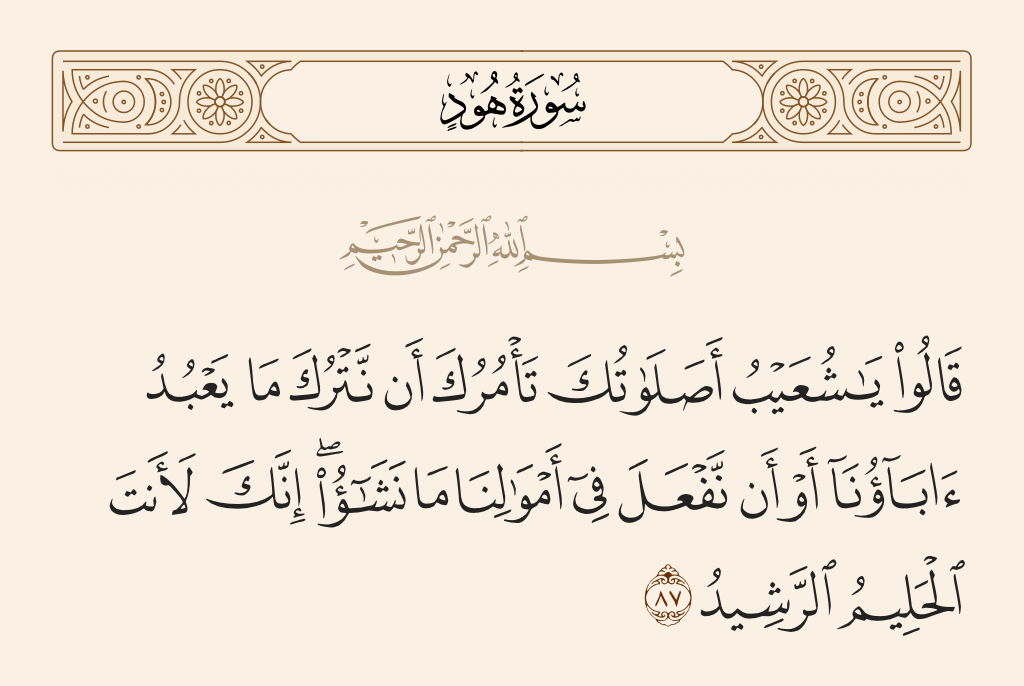Surat Hud Verse No. 87: Reading and listening
Translation of the verse 87 from Surah Hud : Number of verses 123 - - page 231 - Part 12.

﴾قَالُواْ يَٰشُعَيۡبُ أَصَلَوٰتُكَ تَأۡمُرُكَ أَن نَّتۡرُكَ مَا يَعۡبُدُ ءَابَآؤُنَآ أَوۡ أَن نَّفۡعَلَ فِيٓ أَمۡوَٰلِنَا مَا نَشَٰٓؤُاْۖ إِنَّكَ لَأَنتَ ٱلۡحَلِيمُ ٱلرَّشِيدُ ﴿
[ هود: 87]
They said: "O Shu'aib! Does your Salat (prayer) (i.e. the prayers which you offer has spoiled your mind, so you) command that we leave off what our fathers used to worship, or that we leave off doing what we like with our property? Verily, you are the forbearer, right-minded!" (They said this sarcastically).
English - Sahih International
They said, "O Shu'ayb, does your prayer command you that we should leave what our fathers worship or not do with our wealth what we please? Indeed, you are the forbearing, the discerning!"
Tafheem-ul-Quran by Syed Abu-al-A'la Maududi
(11:87) They replied: 'O Shu'ayb! Does your Prayer enjoin upon you *96 that we should forsake the deities whom our forefathers worshipped, or that we should give up using our wealth as we please? *97 Do you fancy that you, and only you, are forbearing and right-directed?'
Tafheem-ul-Quran by Syed Abu-al-A'la Maududi
*96). This, in fact, is a taunting remark. Remarks which are expressive of the same spirit are heard today among every group of people who are heedless of God and who are engrossed in sin and evil. Prayer is obviously the first and the most obvious symbol of man's religious orientation. That orientation is not simply considered a dangerous disease, but the most dangerous one by irreligious people. Hence, Prayer is looked upon by these people as a manifestation of mental derailment rather than what it actually is - an act of worship. Irreligious people are also aware that those who become religiously committed are not content merely with self-reform. Such people are wont to go a step further and strive to reform others. Not only that, but it even becomes difficult for such people to refrain from criticizing attitudes opposed to religion and morality. Hence, irreligious people feel jittery because they fear that Prayer is not simply performed as a religious ritual but that it is the precursor of endless sermonizing on religion and morality. In addition, it may even lead to scathing criticisms of every aspect of social life. It is for this reason that Prayer is often singled out for every kind of taunt and reproach. Moreover, if those who observe Prayer criticize the evils rampant in their society and urge people to act righteously, this inspires opponents of religion to direct every possible invective against Prayer and to lash out at it as the source of every conceivable evil.
*97). This is a full-blooded expression of the world-view of Ignorance (Jahiliyah) as distinguished from that of Islam. The Islamic view is that all worship except the worship of God is erroneous. It is erroneous because worshipping any other than the One True God is supported by nothing - neither reason, knowledge, nor revelation. Moreover, God should not only be worshipped in the limited sphere of life called 'religion'. God's worship should extend to all aspects of life - social, cultural, economic and political. For all that man has in the world belongs only to God. Man, therefore, has no right to consider any aspect of his life to be independent of God's guidance.
The contrary of this is Jahiliyah. According to this view, man ought to observe the customs and usages he inherits from his ancestors, and he ought to do so merely because they come down from the past. This world-view considers religion to be confined to the domain of ritual; the ritual of worship. As for the ordinary affairs of worldly life, man ought to act as he pleases.
It is thus quite clear that there is nothing so 'modern' about the tendency of driving a wedge between the religious and secular spheres of life. For some three and a half thousand years ago the nation of Shu'ayb was as emphatically insistent on bifurcating life into two water-tight compartments - the secular and the religious - as Westerners and their Eastern disciples of our time are wont to do. There seems little justification, therefore, to characterize the attitude of the present-day secularists as something altogether novel, as an attitude that has emerged in modern times as a result of the cumulative intellectual progress of mankind. Far from it, the new-fangled ideology which is being played up everywhere for its freshness and newness is, in fact, the same stale, old-fashioned obscurantism which characterized Jahiliyah several thousand years ago. Likewise, the Islamic defiance of, and opposition to, Jahiliyah is also a perennial reality of human history.